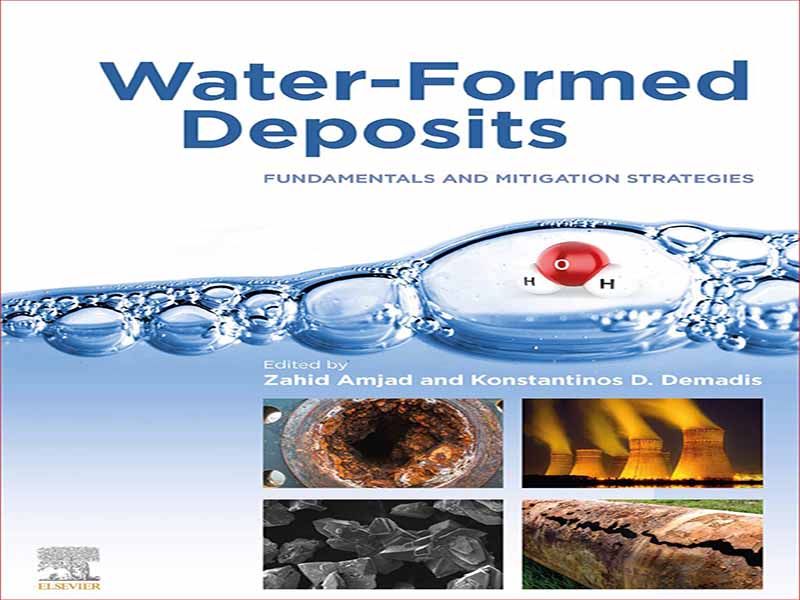- عنوان کتاب: Water-Formed Deposits
- نویسنده: Zahid-Amjad
- حوزه: شیمی مواد
- سال انتشار: 2022
- تعداد صفحه: 243
- زبان اصلی: انگلیسی
- نوع فایل: pdf
- حجم فایل: 32.8 مگابایت
جدا از نقش آشکار آن در حفظ حیات، آب نقش مهمی در اقتصاد جهانی ایفا می کند، زیرا به عنوان یک حلال جهانی برای طیف گسترده ای از مواد شیمیایی عمل می کند و خنک سازی و حمل و نقل صنعتی را تسهیل می کند. با وجود آب آشامیدنی، آب صنعتی بخش بزرگی از مصرف آب را تشکیل می دهد. آب در تاسیسات و کاربردهای بزرگی مانند برج های خنک کننده، بویلرها، بازیافت انرژی زمین گرمایی، عملیات حفاری نفت، تولید مواد غذایی، تولید خمیر و کاغذ، نمک زدایی، ساخت نیمه هادی ها، صنعت آبجوسازی، کاربردهای خشکشویی خانگی و صنعتی استفاده می شود. تعداد کمی. آب علیرغم اینکه برای بشر «نعمت» است، به ویژه در فرآیندهای صنعتی منشأ مشکلاتی است. این فرآیندها معمولاً به چهار کلاس عمده طبقه بندی می شوند: (الف) تشکیل رسوبات و رسوبات معدنی، یعنی کربنات کلسیم CaCO3، گچ CaSO4 _2H2O، باریت BaSO4، فسفات کلسیم Ca3(PO4)2 و غیره. (ب) جامدات معلق که رسوب ایجاد می کنند، مانند گل، سیلت، خاک رس، نمک های رسوب شده، زباله های آلی و غیره؛ (ج) پدیدههای خوردگی که برای سطوح تجهیزات حیاتی فاجعهبار هستند، اما محصولات خوردگی را نیز ایجاد میکنند، مانند ZnO، Fe2O3، Fe3O4، و غیره. و (د) رسوب بیولوژیکی (ریز و ماکرو). این برهمکنش این مواد با سطوح است که مشکلات عملیاتی را در محیط های صنعتی ایجاد می کند، به عنوان مثال سطوح انتقال حرارت در دیگ بخار، خنک کننده، نیروگاه های زمین گرمایی و نیروگاهی، سیستم های تقطیر و تاسیسات اسمز معکوس (RO). مشکلات رایج عبارتند از گرم شدن بیش از حد، از دست دادن کارایی سیستم، زمان خاموش شدن برنامه ریزی نشده و تعویض زود هنگام تجهیزات. بنابراین، عملکرد کارآمد سیستمهای آب صنعتی تا حد زیادی به کنترل این رسوبات بستگی دارد، از طریق حذف علت(های) آنها، یا مبارزه با خود مشکل، یا انجام اقدامات اصلاحی پس از خرابی.
Apart from its obvious role to sustain life, water plays an important role in the world economy, as it functions as a universal solvent for a wide variety of chemical substances and facilitates industrial cooling and transportation. Potable water notwithstanding, industrial water constitutes a large portion of water usage. Water is used in large facilities and applications, such as cooling towers, boilers, geothermal energy recovery, oil drilling operations, food production, pulp and paper manufacturing, desalination, semiconductor manufacturing, brewing industry, domestic and industrial laundry applications, just to mention a few. In spite of water being a “blessing” to humankind, it is a source of problematic issues, especially in industrial processes. These processes are usually categorized into four major classes: (a) formation of mineral scales and deposits, i.e., calcium carbonate CaCO3, gypsum CaSO4 _2H2O, barite BaSO4, calcium phosphate Ca3(PO4)2, etc.; (b) suspended solids that create fouling, i.e., mud, silt, clay, precipitated salts, organic debris, etc.; (c) corrosion phenomena that are catastrophic for critical equipment surfaces, but also generate corrosion products, i.e., ZnO, Fe2O3, Fe3O4, etc.; and (d) biological (micro and macro) fouling. It is the interaction of these materials with surfaces that creates operational issues in industrial environments, for example, heat transfer surfaces in boiler, cooling, geothermal and power plants, distillation systems, and reverse osmosis (RO) installations. Common problems include overheating, loss of system efficiency, unscheduled shutdown time, and premature equipment replacement. Thus, the efficient operation of industrial water systems is largely dependent on the control of these deposits, by either removing their cause(s), or combating the problem itself, or taking corrective measures after failure.a
این کتاب را میتوانید از لینک زیر بصورت رایگان دانلود کنید:
Download: Water-Formed Deposits





































نظرات کاربران